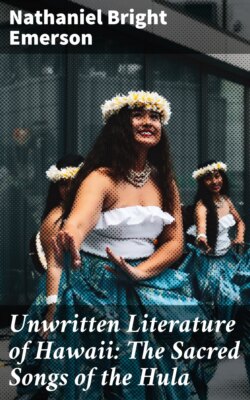Читать книгу Unwritten Literature of Hawaii: The Sacred Songs of the Hula - Nathaniel Bright Emerson - Страница 37
На сайте Литреса книга снята с продажи.
[Translation]
ОглавлениеAltar-Prayer (to Laka)
This my wish, my burning desire,
That in the season of slumber
Thy spirit my soul may inspire,
Altar-dweller,
5
Heaven-guest,
Soul-awakener,
Bird from covert calling,
Where forest champions stand.
There roamed I too with Laka,
10
Of Lea and Loa a wilderness-child;
On ridge, in forest boon companion she
To the heart that throbbed in me.
O Laka, O Laka,
Hark to my call!
15
You approach, it is well;
You possess me, I am blest!
Footnote 71:(return) Lea. The same as Laia, or probably Haumea.
Footnote 72:(return) Wahie loa. This must be a mistake. Laka the son of Wahie-loa was a great voyager. His canoe (kau-méli-éli) was built for him by the gods. In it he sailed to the South to rescue his father's bones from the witch who had murdered him. This Laka had his home at Kipahulu, Maui, and is not to be confounded with Laka, goddess of the hula.
In the translation of this pule the author has found it necessary to depart from the verse arrangement that obtains in the Hawaiian text.
The religious services of the halau, though inspired by one motive, were not tied to a single ritual or to one set of prayers. Prayer marked the beginning and the ending of every play--that is, of every dance--and of every important event in the programme of the halau; but there were many prayers from which the priest might select. After the prayer specially addressed to Laka the visitor might use a petition of more general scope. Such is 'the one now to be given:
He Pule Kuahu (ia Kane ame Kapo); a he Pule Hoolei
Kane, hikii a'e, he malâma 73 la luna;
Ha'aha'a, he maláma ia lalo;
Oni-oni, 74 he málama ia ka'u;
He wahine 75 lei, málama ia Kapo;
5
E Kapo nui, hala-hala 76 a i'a;
E Kapo nui, hala-hala 77 a mea,
Ka alihl 78 luna, ka alihi lalo;
E ka poha-kú. 79
Noho ana Kapo i ka ulu wehi-wehi;
10
Ku ana i Moo-helaia, 80
Ka ohi'a-Ku iluna o Mauna-loa.
Aloha mai Kaulana-a-ula 81 ia'u;
Eia ka ula la, he ula leo, 82
He uku, he mohai, he alana,
15
He kanaenae na'u ia oe, e Kapo ku-lani.
E moe hauna-ike, e hea au, e o mai oe.
Ata la na Iehua o Kaana, 83
Ke kui ia mai la e na wahlne a lawa
I lei no Kapo--
20
O Kapo, alii nui no ia moku,
Ki'e-ki'e, ha'a-ha'a;
Ka la o ka ike e ike aku ai:
He ike kumu, he ike lono;
He ike pu-awa 84 hiwa,
25
He ike a ke Akua, e!
E Kapo, ho'i!
E ho'i a noho i kou kuahu.
Ho'ulu ia!
Eia ka wai, 85 la,
20
He wai e ola.
E ola nou, e!
Footnote 73:(return) Malâma. Accented on the penult, as here, the word means to enlighten or a light (same in second verse). In the third and fourth verses the accent is changed to the first syllable, and the word here means to preserve, to foster. These words furnish an example of poetical word-repetition.
Footnote 74:(return) Onioni. To squirm, to dodge, to move. The meaning here seems to be to move with delight.
Footnote 75:(return) Waliine lei. A reference to Laka, the child of Kapo, who was symbolized by a block of wood on the altar. (See p. 23.)
Footnote 76:(return) Hala-hala a i'a. Said to be a certain kind of fish that was ornamented about its tailend with a band of bright color; therefore an object of admiration and desire.
Footnote 77:(return) Hala-Hala a mea. The ending mea is perhaps taken from the last half of the proper name Hau-mea who was Kapo's mother. It belongs to the land, in contrast to the sea, and seems to be intended to intensify and extend the meaning of the term previously used. The passage is difficult. Expert Hawaiians profess their inability to fathom its meaning.
Footnote 78:(return) Alihi luna. The line or "stretching cord," that runs the length of a net at its top, the a lalo being the corresponding line at the bottom of the net. The exact significance of this language complimentary to Kapo can not be phrased compactly.
Footnote 79:(return) Poha-kú. The line that runs up and down at the end of a long net, by which it may be anchored.
Footnote 80:(return) Moo-helaia. See note a, p. 33.
Footnote 81:(return) Kaulana-a-ula. See note d, p, 33.
Footnote 82:(return) Ula leo. See note e, p. 33.
Footnote 83:(return) Kaana. A place on Mauna-loa, Molokai, where the lehua greatly flourished. The body of Kapo, it is said, now lies there in appearance a rock. The same claim is made for a rock at Wailua, Hana, Maui.
Footnote 84:(return) Pu-awa hiwa (hiwa, black). A kind of strong awa. The gentle exhilaration, as well as the deep sleep, of awa were benefits ascribed to the gods. Awa was an essential to most complete sacrifices.
Footnote 85:(return) Wai. Literally water, refers to the bowl of awa, replenished each day, which set on the altar of the goddess.
Verses 9 to 15, inclusive, are almost identical in form with the first seven verses in the Mele Kuahu addressed to Laka, given on page 33.
